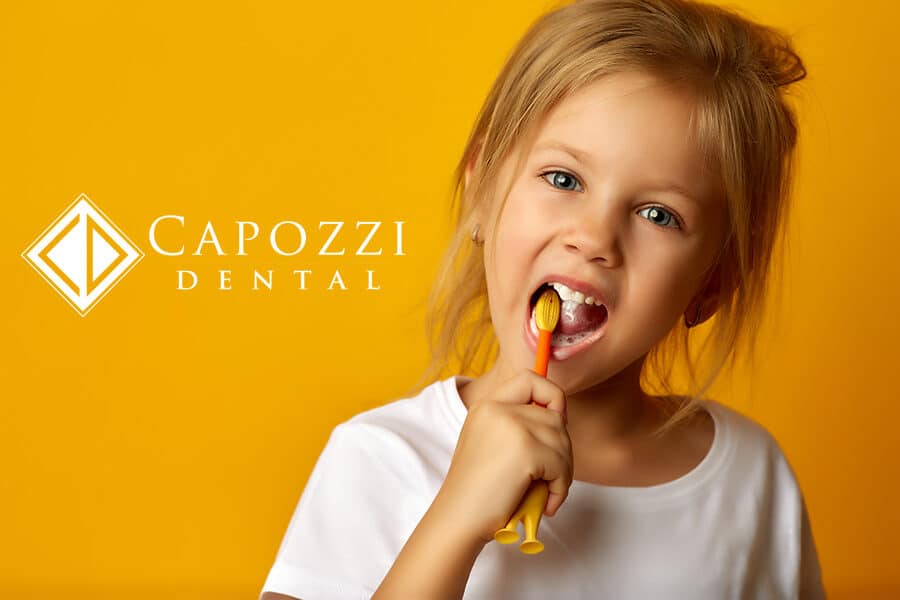It’s important for parents to get children excited about brushing their teeth at a young age. Then once they are old enough, allow them to start learning to brush their own teeth with supervision.
Once a child’s teeth come in, begin brushing teeth daily with a soft-bristled toddler toothbrush and a dab of toothpaste the size of a grain of rice. Children should see a dentist after their first tooth emerges or by their first birthday.
Teach them to spit
At age two teach your child to spit out the extra toothpaste into the sink. This teaches them not to swallow the toothpaste. If they swallow a little they will be fine but fluorinated toothpaste isn’t recommended for children under the age of 2. This first step helps introduce your child to the idea of caring for their own teeth.
Have them practice brushing
Young kids, even toddlers, might try to grab the toothbrush and brush their baby teeth on their own. It’s good to let them do this sometimes so that they feel like a big kid, but don’t forget to follow up with proper brushing yourself. It’s great that your child is showing an interest in their dental care, but at a young age, they can’t brush every which way on their own and still need adults to remain in control of the health of their teeth.
If your child can tie their own shoes, they’re definitely old enough to be brushing their own teeth. Once your child can figure out the coordination it takes to tie up their laces, they have the mental and physical ability to brush themselves. You can now let them mostly hold the brush and do the brushing on their own. Just supervise and help them as needed.
Tips to make flossing easier:
Don’t forget to floss! Flossing should begin when and where teeth are touching. Molars usually begin touching at ages 3-5. At this point, food and plaque can easily get trapped between the teeth, leading to cavities. If you’re able to effectively use traditional floss for your child’s teeth, teach them the same flossing techniques adults use when they are old enough to start picking it up on their own. You can show them how to wrap the floss firmly around their fingers and pull it tight so that it is more effective in removing plaque and food particles from their mouth.
Consider buying some floss picks if you are struggling with traditional floss. This will make it much easier to reach between your child’s teeth effectively, and they are also much easier for children to use on their own when they learn to floss. Additionally, individual floss picks come in fun shapes and colors that may make your child more interested in nightly flossing.
Reward them for good dental practices:
Praising your child for doing a good job is another motivator. Using rewards like colorful stickers may help encourage those harder-to-motivate kids.
Being a part of your child’s dental routine is very important. As they grow, they’ll learn more and more about how to care for their teeth, and that’s why it’s so important that you’re there to keep their oral care in check. Starting and practicing good dental habits at a young age can help keep their teeth and gums healthy for decades to come!
There is no definite time that all kids are able to brush their teeth on their own. It varies from child to child, but you can use these guidelines to determine when your own child is ready. Even after they start brushing on their own, don’t forget to supervise and continue to help with the rest of their dental routine, such as flossing and making sure they visit the dentist for a routine checkup every six months.



